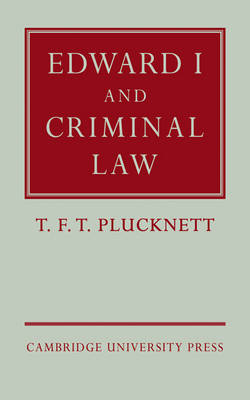
Edward I and Criminal Law
Seiten
2008
Cambridge University Press (Verlag)
978-0-521-08565-6 (ISBN)
Cambridge University Press (Verlag)
978-0-521-08565-6 (ISBN)
The main theme of Professor Plucknett's Wiles Lectures is the transition from the local legislation of Anglo-Saxon times to the beginnings of the English common law under feudalism, and especially under Edward I's direction. Professor Plucknett examines the early laws, which were mainly the attempts of perplexed men in a harsh age to fix a value on human life and property.
The main theme of Professor Plucknett's Wiles Lectures is the transition from the local legislation of Anglo-Saxon times to the beginnings of the English common law under feudalism, and especially under Edward I's direction. Professor Plucknett examines the early laws, which were mainly the attempts of perplexed men in a harsh age to fix a value on human life and property, and to enforce the exaction of these monetary penalties: wer and bot and wite. He then shows how the common law under Edward I became more technical, more concerned with principles, and of course more universal and better enforced. In the course of his argument Professor Plucknett touches on other important problems, notably the place of the Crown and its supremacy over other institutions, the influence of Christian thought, as expressed in the Penitentials and by the moral theologians (especially as to the place of intention), the substitution of trial by jury for trial by ordeal, the organization of local government, the triumph of Parliament and the rise of the legal profession.
The main theme of Professor Plucknett's Wiles Lectures is the transition from the local legislation of Anglo-Saxon times to the beginnings of the English common law under feudalism, and especially under Edward I's direction. Professor Plucknett examines the early laws, which were mainly the attempts of perplexed men in a harsh age to fix a value on human life and property, and to enforce the exaction of these monetary penalties: wer and bot and wite. He then shows how the common law under Edward I became more technical, more concerned with principles, and of course more universal and better enforced. In the course of his argument Professor Plucknett touches on other important problems, notably the place of the Crown and its supremacy over other institutions, the influence of Christian thought, as expressed in the Penitentials and by the moral theologians (especially as to the place of intention), the substitution of trial by jury for trial by ordeal, the organization of local government, the triumph of Parliament and the rise of the legal profession.
1. Reparation and the Victim; 2. The Crow and its Rights; 3. The Criminal and Intention; 4. Edward I and Criminal Law.
| Erscheint lt. Verlag | 14.10.2008 |
|---|---|
| Reihe/Serie | The Wiles Lectures |
| Zusatzinfo | Worked examples or Exercises |
| Verlagsort | Cambridge |
| Sprache | englisch |
| Maße | 126 x 202 mm |
| Gewicht | 140 g |
| Themenwelt | Geschichte ► Teilgebiete der Geschichte ► Militärgeschichte |
| Recht / Steuern ► EU / Internationales Recht | |
| Recht / Steuern ► Rechtsgeschichte | |
| Recht / Steuern ► Strafrecht | |
| ISBN-10 | 0-521-08565-9 / 0521085659 |
| ISBN-13 | 978-0-521-08565-6 / 9780521085656 |
| Zustand | Neuware |
| Haben Sie eine Frage zum Produkt? |
Mehr entdecken
aus dem Bereich
aus dem Bereich
neueste Manipulationstechniken als Waffengattung der NATO
Buch | Softcover (2023)
Westend (Verlag)
24,00 €
Deutschlands Schwäche in der Zeitenwende
Buch | Softcover (2023)
C.H.Beck (Verlag)
18,00 €


